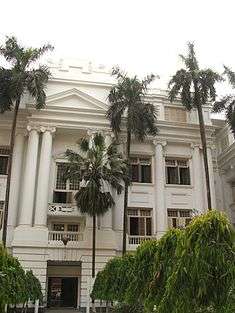Pradyut Ghosh
| Pradyut Ghosh | |
|---|---|
| Born |
February 17, 1970 Birsingha, Medinipur District, West Bengal, India |
| Residence | Kolkata, West Bengal, India |
| Nationality | Indian |
| Alma mater | |
| Known for | Studies on chemical sensing of anions, interlocked molecules and self-assembly |
| Awards |
|
| Scientific career | |
| Fields | |
| Institutions | |
| Doctoral advisor |
|
Pradyut Ghosh (born 1970) is an Indian inorganic chemist and a professor at the Indian Association for the Cultivation of Science.[1] He is known for his studies on chemical sensing of anions, interlocked molecules and self-assembly[2] and is a recipient of the Swarnajayanthi Fellowship of the Department of Science and Technology and the Bronze Medal of the Chemical Research Society of India.[3] The Council of Scientific and Industrial Research, the apex agency of the Government of India for scientific research, awarded him the Shanti Swarup Bhatnagar Prize for Science and Technology, one of the highest Indian science awards, in 2015, for his contributions to chemical sciences.[4]
Biography

Born on 17 February 1970 in a farmers' family at the village of Birsingha in Medinipur District of the Indian state of West Bengal,[3] Pradyut Ghosh graduated in chemistry in 1990 and followed it up with a master's degree in 1992 from Calcutta University.[5] Enrolling for his doctoral studies under the guidance of Parimal K. Bharadwaj at the Indian Institute of Technology, Kanpur,[6] he secured a PhD in 1998 and moved to the US to pursue his post-doctoral studies under Richard M. Crooks. Returning to India in 2000, he joined Central Salt and Marine Chemicals Research Institute (CSMCRI) as a scientist and in 2001, he received an Alexander von Humboldt fellowship which enabled him to continue his professional studies with Fritz Vögtle and Christoph Schalley[7] at Kekulé Institute of Organic Chemistry and Biochemistry of University of Bonn. He resumed his duties at CSMCRI in 2002 as a C-Grade Scientist, a post he held till 2007 during which time he had a second spell at Bonn University from April to October 2003. In 2007, he joined Indian Association for the Cultivation of Science as an assistant professor where he served as the head of the department of inorganic chemistry from 2012 to 2015 and is a professor there.[5]
Legacy
Ghosh is reported to have done extensive researches on Anion recognition, molecular capsules, chemical sensing of Ions, inorganic salt extraction, supramolecular aggregations and interlocking molecules.[5] He has developed several ligands with varying anion recognition elements as well as methodologies for selective sensing of phosphates, separation of hydrated metal sulphates/potassium bromide and bromide removal using halogen bonding.[2] The development of Gypsum chalk replacing the calcium carbonate-made chalk which was in use traditionally was one of his notable contributions.[3] His researches have been documented by way of a number of peer-reviewed articles;[8] ResearchGate, an online article repository of scientific articles, has listed 112 of them respectively.[9] He holds a patent for the process developed by him viz. Process for the recovery of palladium from spent silica.[10] He sat in the national organizing committee of inaugural Frontiers of Organometallic Chemistry, a biennial symposium on Organometallics held at Thiruvananthapuram in December 2016[11] and has delivered several invited and plenary addresses.[2] He has also mentored several scholars in their doctoral and post-doctoral studies[12] and has been involved in a number of projects for agencies such as Council of Scientific and Industrial Research, The World Academy of Sciences, Department of Science and Technology of India and Science and Engineering Research Board.[13]
Awards and honors
Ghosh received the Young Scientist Award of the Indian Science Congress Association in 1998[14] and the Young Scientist Award of the Council of Scientific and Industrial Research in 2004.[15] The B. M. Birla Science Prize in Chemical Sciences reached him in 2009[16] the same year as he received the Swarnajayanthi Fellowship of the Department of Science and Technology.[3] This was followed by the Bronze Medal of the Chemical Research Society of India in 2012.[17] The Council of Scientific and Industrial Research honored him again with the Shanti Swarup Bhatnagar Prize, one of the highest Indian science awards, in 2015.[18]
See also
References
- ↑ "Brief Profile of the Awardee". Shanti Swarup Bhatnagar Prize. 2016. Retrieved November 12, 2016.
- 1 2 3 "Speaker profile". Indian Academy of Sciences. 2016.
- 1 2 3 4 "The New Global Research Hotspot: Molecular Magic". India Today. September 10, 2011.
- ↑ "View Bhatnagar Awardees". Shanti Swarup Bhatnagar Prize. 2016. Retrieved November 12, 2016.
- 1 2 3 "Faculty profile". Indian Association for the Cultivation of Science. 2016.
- ↑ "Display Alumni Newsmakers". IITK Alumni Association. 2016.
- ↑ "Former Schalley Lab Members". Schalley Lab Homepage. 2016.
- ↑ "Publications". Indian Association for the Cultivation of Science. 2016.
- ↑ "On ResearchGate". ResearchGate. 2016.
- ↑ Arvindkumar Balvantrai Boricha; Hari Chand Bajaj; Raksh Vir Jasra; Pradyut Ghosh; Pushipito Kumar Ghosh (September 19, 2006). "Process for the recovery of palladium from spent silica". Patent No. 7108839. US Patent.
- ↑ "National Organising Committee". Frontiers of Organometallic Chemistry. 2016.
- ↑ "Dr. Purnandhu Bose". NIMS. 2016.
- ↑ "Sponsored Projects". Indian Association for the Cultivation of Science. 2016.
- ↑ "ISCA Young Scientist Award". Indian Science Congress Association. 2016.
- ↑ "CSIR Young Scientist Award". Council of Scientific and Industrial Research. 2016.
- ↑ "B. M. Birla Science Prize". B. M. Birla Science Centre. 2016.
- ↑ "CRSI Bronze Medal". Chemical Research Society of India. 2016.
- ↑ "Chemical Sciences". Council of Scientific and Industrial Research. 2016. Archived from the original on 2012-09-12.
External links
- "Dr. Pradyut Ghosh". Ghosh at his laboratory. India Today Images. 2016.